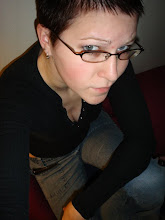(Thissuns a li'l bit more rantlike and interesting if you haven't read my class readings)
In the excerpt we read from her book A Desired Past, Leila Rupp made many interesting points. I think she really hit the nail on the head (er.. one of the times she hit the nail on the head) when she commented that “history… is not the one ‘true story.’ Rather, it is a story as best we can tell it, given the evidence, our own assumptions and values, and the perspective we take from our own place in a particular society at a specific point in time. (14)” While the investigation into the history of sexuality is absolutely invaluable and interesting and necessary, I think it is all too common for people to take the very narrow dogmatic stance of finding “historical facts” and using them to write “true history.” But in reality this isn’t possible. (I would argue that this is true of just about ANY inquiry.) Any possible evidence that can be perceived and assigned relevance is doing just that: being taken into consideration by someone’s (or even a group of people’s) individualized perception and is having it’s historical relevance assigned to it based on that person’s ideas, disposition, what he/she is looking for, experiences, etc etc etc. That’s because no matter what journal entry, court case, or other physical evidence we come across, it is historical, meaning no longer in context. Though we can grasp some part of the essence of the context through this evidence, it is not possible to absolutely understand the context of the events, human emotions, dispositions, cultures, behaviors that took place throughout human history. (Even if the individual doing the historical inquiry was, in fact, there, they are still limited to their own perspective.)
That said, this inquiry is still absolutely invaluable because of the effect it has on our current context. By studying other cultures, times, any “other” possibilities of human existence, we open our minds to alternate possibilities for our own existence. Even if our perception of the actual manifestation of these possibilities in other time and space isn’t entirely accurate, we are still opening our mind to them and creating a better understanding of who/what/when/where/how/why humans do and/or can exist as well as who/what/when/where/how/why we understand ourselves as such. This learning process and movement toward understanding is important because without it, humanity would be static, unmoving, and unchanging. One absolute constant in human history is change and evolution. Remaining absolutely stagnant goes against human nature. Human history from just about any perspective will tell you that.
Skipping many other very interesting statements made by Rupp, I am very intrigued by Foucault’s way of looking at things. At this point, I have read very little of his work and may not be interpreting it correctly, but what I have gotten from it is interesting never the less. Instead of looking at human sexual history with a critical eye and using repression for a foundation, why not take it all into consideration more objectively? I think Ayn Rand put it rather well when she was asked whether man’s altering of nature is natural: “Well, what do you think man is? Outside of nature? A supernatural being?” Though my views are significantly different from hers and she was reaching a very specific point with a very specific question in this quote, I think she brings up a very interesting point: In the vast diversity of human behavior and experience, who’s to say what’s natural? Are hetero-monogamous relationships “natural” for humans? Is bestiality? Sodomy? Inter-generational/racial sex? Rape? Orgies? Polyamory? Masturbation? Etc Etc Etc…. The mere fact that mankind took their behavior in these directions at any point in time proves that, to some extent, they are all part of human nature. In the same way that the fear that creates the ideas that some of these behaviors AREN’T natural is part of human nature. With that in mind, the studying of human sexuality, including the repression itself, should be regarded with an objective mind, taking into consideration that all different sides of the story offer evidence and information about human nature, which is incredibly diverse and complex. It seems to me that this attempt at an objective eye is the goal of queer studies. But again, just how capable are we of being absolutely objective? All we can do is try. Then, if and when we catch ourselves applying any form of bias to our studies and attempts to attain understanding, perhaps we can correct ourselves, moving toward a more thorough and maybe even more accurate understanding of whatever it is that we are studying.
Monday, January 19, 2009
Subscribe to:
Post Comments (Atom)




No comments:
Post a Comment